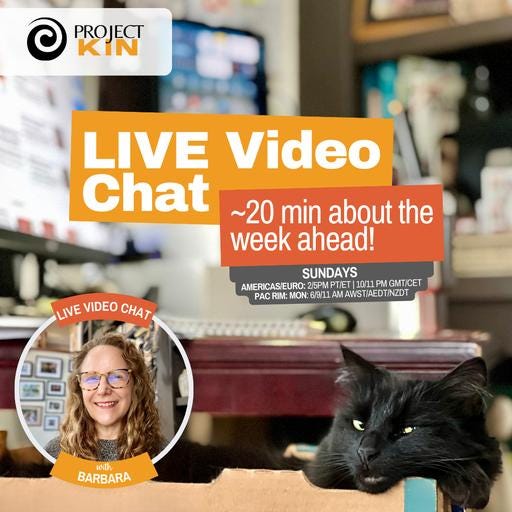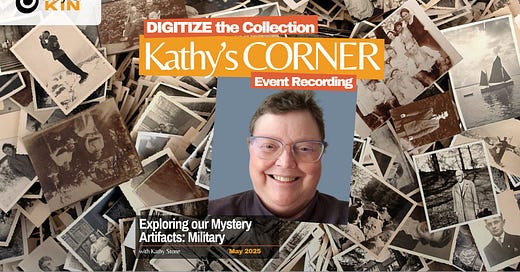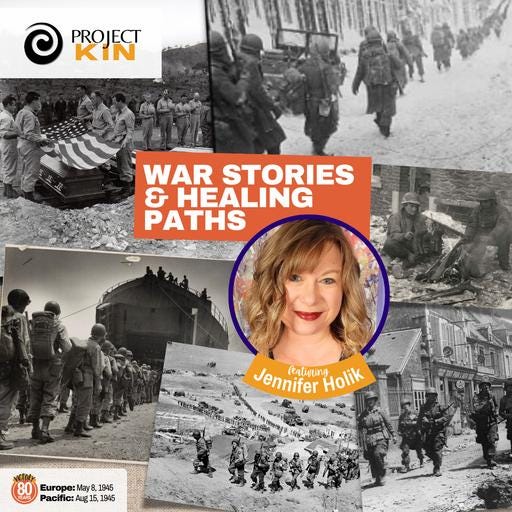As Projectkin, we’re hooked on family history stories. So often, these stories start with the artifacts, documents, and photographs left for us by our ancestors. In Kathy’s Corner, Projectkin contributor , helps us sort through and make sense of these materials with insights learned in her decades of experience as a professional photo organizer. Explore our calendar for coming events here.
We were thrilled by another richly informative hour with Kathy. Today’s focus was on the artifacts and mementos we inherit in our family collections that relate to experiences during periods of war. Kathy shared several examples from her own collection.
Stay tuned for a very special program coming up in the first week of June that drills into this topic, featuring
of , “War Stories & Healing Paths,” on Thursday, June 5th.Resources
Identifying military artifacts and their history tends to be regional or specific to service branches. To help you research the history behind artifacts in your family collection, Kathy shared a number of resources she’s aware of.
If you have others, please drop them in the comments to share with others in our community.
National Archives UK
UK National Archives » Research Guides
British Army Soldiers in service after 1918
Library and Archives of Canada
Military Pages at the Library and Archives of Canada
US National Archives
US National Archives
The Internet Archive
Search for “Military” or drill down further
Other References
Kathy’s Ship-in-a-Bottle story
As shared in
’s Show & Tale series.
Military History Substacks
These are just a few examples.1
From
whose popular blog at ChiddicksFamilyTree.com is blended with his active Substack at ChiddicksFamilyTree.My Favorite Find: A Hero’s Medals Saved by Chance
In his post, Hidden Treasures: Preserving the stories behind family heirlooms, Paul referenced the pin cushion and mystery photo belonging to Projectkin member
we talked about in today’s program.chiddicksfamilytree.com/2024/12/19/hidden-treasures-preserving-the-stories-behind-family-heirlooms. As Paul shares in the post, these are:
A pin cushion with the insignia of The Royal Fusiliers.
The photograph of a serving soldier of the Royal Fusiliers—a man who likely crafted the cushion with his own hands
Image Evaluation Tools
We’ve talked about many of these in different events, but Kathy’s reference to her Ship-in-a-Bottle story and the nearby Prisoner of War camp in western Canada sent me to dig up:
Picarta.ai: A nifty tool with a 3-per-day free plan that gives you the GPS coordinates with a degree of confidence for any photograph that includes known landmarks.
Related Faces: A software platform that gives you a new way to identify unknown family members in your photos. Our software isolates and maps faces and then compares them to reveal previously unknown connections.
WWII Prisoner of War Camps: Since this was new to me, I thought you might find it interesting as well. Wikipedia includes a remarkable listing of prisoner-of-war camps worldwide.
Finally, as Kathy hinted at the conclusion of today’s program, she’ll be joining me again on Sunday at 2/5 PM PT/ET, 10 PM BST for my weekly Substack Live program to tip her hand to a special announcement. Join us!

If you’re specifically interested in military history, consider updating your Substack account to reflect Military History as a topic of interest. Here’s how. Go to your Account Settings by logging into your account then navigating to
Once there, scroll down to “Content Preferences” and review the alphabetized list. Tap on History, then view the subcategories, and give Military History a thumbs up. Note that this is the account level setting, distinct from the categories you select for your publication.





















Share this post